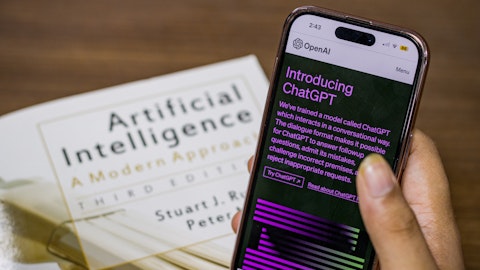So, couldn’t be more excited about the momentum we’re starting to see with Amazon and their commitment to the partnership is equally exciting as the impact on customers and our ability to extend reach around the world. So — and this is just one example of. So, yes, we’re seeing meaningful traction in both areas. And Latin America as well. We continue to see our partners in both Brazil and Mexico expand and accelerate in market as we’re fueling their growth. So, internationally, we feel good about what we’re seeing.
Operator: [Operator Instructions] The next question comes from Stephen Sheldon with William Blair. Please go ahead.
Stephen Sheldon: Taking my questions. First one here wanted to dig in a little more on the Badging and specifically, how important it could be to enterprise customers to be able to provide skills badges to employees. And just thinking about it from an employer’s perspective, you positively might get more visibility into skills within your organization, but it could also arguably make your employees to get badges more marketable if they wanted to move to another company. So just curious, if that’s ever concern you here, or does it kind of seem like providing badges and these kind of skills pathways will become broadly accepted. If employers don’t offer them, it could hurt their ability to recruit talent. Just curious, what you’re hearing in conversations on this front although I know it’s really early.
Greg Brown: Yeah. Steve, thanks for the question. It is early. But I believe the short answer is I believe the latter is how it’s going to play out that it’s going to be more of a standard and that if employers and organizations don’t offer validation in the form of badging and certifications, they’re going to be a bit of an outlier. So I believe this soon is going to be a standard in most organizations. But as we talked about, we couldn’t be more excited about the Integrated Skills Framework that we’re bringing to market and the impact we’re already starting to see it have on our ability to win deals. I just mentioned, we’re winning business right now as a result of the initial capability that we’ve launched as well as what’s to come.
And what’s to come is probably as if not more exciting than what we’ve already got out there. Right now, organizations have the ability with first phase to understand the skills that are being acquired and skills benchmarks, how their organization stacks up against other organizations in a particular marketplace or vertical. But what’s coming is the ability to identify skills gaps within the organization and address those skills gaps with pre-built pass right, that are going to enable them. It’s really kind of completing the circle if you will or the flywheel that they need to continue to accelerate as far as their ability to keep up with the pace of change and upskill and reskill their employees, to enable them to reach the outcomes they’re trying to achieve as an organization.
We’ve done a tremendous amount of work with our customers, advisory councils and the like. And we have a strong signal from our customers and everybody that we work with that this is exactly what they need in a hypercompetitive world, not just today but tomorrow to be able to execute their strategy. So I feel really good about the early impact. We feel really good about the response from the marketplace and feel even better about where we’re going and what’s to come.
Stephen Sheldon: Great to hear it. Yeah. That’s really helpful. And then as a follow-up, just I think you maybe talked about still seeing some good growth in multi-year contracts. How — what do you see in terms of willingness for enterprises to sign up for multi-year contracts in this environment? And within that, kind of how do you think about balancing pricing in order to secure these multi-year deals. And maybe the trade-off between the two is I’d assume you’re giving up some to secure the longer commitments. How do you — so yes demand what are you seeing in terms of the willingness to sign up? And how do you think about balancing pricing to secure it.
Greg Brown: Yeah. I’ll start and Sarah, feel free to add. I feel really good about what we saw in terms of multi-year contracts come in this last quarter. We actually saw a slight bump, right? So we continue to execute very well in terms of our sales organization executing the play if you will. And that only happens, if the customer believes that there’s value, strategic value which gives them the confidence and willingness to sign a multi-year contract. So I believe again, we’re executing well in market. The other thing I think that’s important to note is our competitive win rate actually increased this quarter, right as a result of a lot of what we’re doing from a product perspective as well as the adjustments we’ve made to our go-to-market motion and the way that we’re approaching customers and how we can add value and impact in the environment we’re operating.
So I think from that standpoint, our teams are doing a nice job of adapting and adjusting to the conditions we’re operating in. Sarah, I don’t know if there’s anything you’d like to add.
Sarah Blanchard: Yeah. I’ll just add from a pricing perspective, we have a very typical enterprise SaaS multi-year discount model and that has not changed. And like Greg said, the percent of ARR coming from multi-year deals is up quarter-over-quarter. We saw a little bit of pressure on multi-year deals in new business, but still we’re able to sell a number of multi-year deals and certainly within our upsells and expansions as well.
Stephen Sheldon: Good to hear. Thank you.
Sarah Blanchard: Thank you.
Operator: The next question comes from Josh Baer with Morgan Stanley. Please go ahead.
Josh Baer: Great. Thanks for the question. Apologies if this was asked already, but was hoping you could give an update on your federal business. And then also, I was wondering if there’s an opportunity to take these new badging initiatives and initiatives around skilling into schools like into the academic world in addition to just the business world. Is that something on the radar? Like schools acknowledging that there might be learning gaps in preparing their students for jobs or careers could bring Udemy and this new offering to its students.




